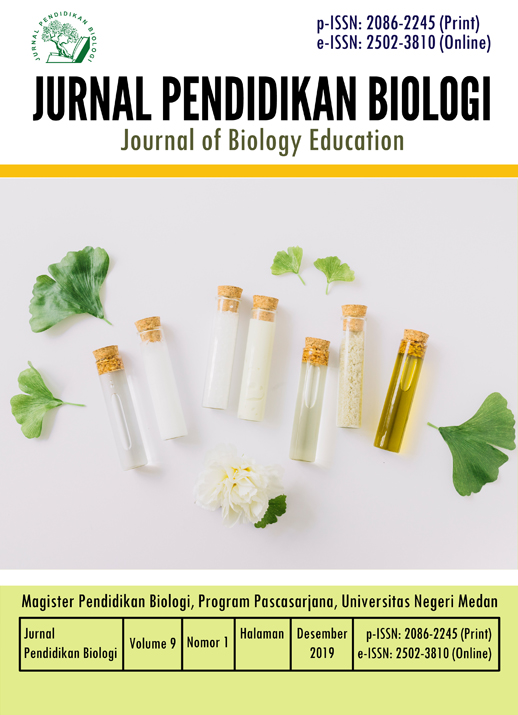Profil Keterampilan Regulasi Metakognisi Ditinjau dari Strata Angkatan Mahasiswa Pendidikan Biologi
DOI:
https://doi.org/10.24114/jpb.v9i1.12011Keywords:
Metacognitive Awareness Inventory, Metacognition skill, Metacognition regulationAbstract
This research aims to determine the profile of metacognition regulation skills and determine the differences in metacognition regulation skills of Biology Education students at one of the Universities in Surakarta based on the strata of the class. This research method uses a survey method. The research population was Biology Education students at one of the Universities in Surakarta consisting of 4 classes totaling 240 students. The research sample was obtained by stratified random sampling technique as much as 30% of the population, namely 18 students per class. The research data was obtained through a questionnaire that referred to the Metacognitive Awareness Inventory (MAI) with indicators of Metacognitive Regulations, including Planning, Information Strategy, Monitoring, Coordination Errors, Understanding Strategies, and Evaluation. Analysis of research data was carried out in quantitative descriptive and ANAVA test. The results of the research showed that the profile of metacognition regulation skills in each class averaged 79.51% with a well-developed category. The profile of the 2015 metacognition regulation skills is 77.80% with a category that has developed well, the 2016 class is 82.48% with a category that has developed well, the 2017 class is 79.81% with a well-developed category, and 2018 is 79, 97% with a well developed category. Skill in regulating metacognition of Biology Education students in Surakarta in 2018/2019 has developed well. The 2016 Biology Education students have the highest average metacognition skills with a score of 82.48%. ANAVA test results showed no difference in metacognitive regulation for each class with a significance value of 0.054.References
Abdillah, A. (2011). Hubungan Kemampuan Metakognitif dan Lingkungan Belajar Rumah Sakit dengan Kemampuan Pemecahan Masalah Asuhan Keperawatan pada Mahasiswa (Akademi Keperawatan Lumajang). Tesis di Bidang Pendidikan Profesi Kesehatan Program Pascasarjana UNS Surakarta.
Arief, R. H., Firdaus, & Ar, N. R. (2011). Profil Kemampuan Metakognisi Mahasiswa Program Studi Pendidikan Biologi FKIP Universitas Riau Berdasarkan Tingkat Masa Studi. Biogenesis (Jurnal Pendidikan Sains dan Biologi), 8(1), 17-24
Arifin, Arifah Novia., Saenab, Sitti. (2014). Perbandingan Kesadaran Metakognitif Siswa Yang Diajar Menggunakan Model Problem-Based Instruction (Pbi) Dengan Kooperatif Tipe Think Pair Share (Tps). Jurnal Bionature, 15 (2), 81-89.
Asmarani, D., & Sholihah, U. (2016). Karakteristik Metakognisi Mahasiswa Dalam Menyelesaikan Masalah Matematika Berdasarkan Langkah-Langkah Polya Dan De Corte. Al-Khwarizmi : Jurnal Pendidikan Matematika dan Ilmu Pengetahuan Alam, 4. https://doi.org/10.24256/akh.v4i1.451
Ayu, N., Aritonng, R. (2019). Metode Kooperatif Jigsaw Sebagai Upaya Meningkatkan Kemampuan Metakognitif dan Prestasi Belajar Siswa. Juenal Keperawatan Vol.9 No.1p 1084-ISSN : 2086-9703 e ISSN : 2621-7694
Barry, M. (2012). What skills will you need to succeed in the future? Phoenix Forward (online). Arizona: University of Phoenix
Budi M, Ipah., Ghofar, Azizul. (2017). Analisis Keterampilan Berpikir Kritis Dan Metakognitif Mahasiswa Program Studi Pendidikan Biologi. Bioma, 6 (1)
Concepción, D. W. (2004). Reading philosophy with background knowledge and metacognition. Teaching Philosophy, 27(4), 351“368.
Djuanda, M. 2008. Urgensi Metakognitif Dalam Meningkatkan Mutu Pembelajaran di Madrasah, (Online), (http://bdkjakarta.kemenag.go.idindex.php?a=artikel &id=884).
Foong, Pui Yee (2002). Using Short Open-Ended Mathematics Questions to Promote Thinking and Understanding. The Mathematics Education into the 21st Century Project. Palermo, Italy
Griffin, P., McGaw, B. and Care, E. (eds). (2012). Assessment and Teaching of 21st Century Skills. Dordrecht: Springer.
Hall, C. W., & Webster, R. E. (2008). Metacognitive and Affective Factors of College Students with and without Learning Disabilities. Journal of Postsecondary Education and Disability, 21(1), 32“41.
Mazancieux, A., Souchay, C., Casez, O., & Moulin, C. (2018). Metacognition and selfawareness in Multiple Sclerosis. Cortex,1(1), 111. https://doi.org/10.1016/j.cortex .2018.11.012
Mukhidin, Esi Febrina. (2019). Metakognitif Sebagai Keterampilan Berfikir Tingkat Tinggi pada Pembelajaran Abad 21. Jurnal Ilmu Pendidikan dan Pengajaran, 6(1)
Nelson-Jones, R. (2015). Basic counselling skills: A Helper™s Manual 4th Edition. Sydney: SAGE Publications Ltd.
Paidi. (2009). Pengembangan Perangkat Pembelajaran dan Pengaruhnya terhadap Kemampuan Metakognitif, Pemecahan Masalah, dan Penguasaan Konsep Biologi. Jurnal Pendidikan Biologi UM, 1(1):20-29
Paidi. (2011). Pengembangan Perangkat Pembelajaran Biologi Berbasis Masalah. Jurnal Kependidikan, 41(2), 185-201
Pai'pinan, Maitus. (2015). Profil Metakognisi Mahasiswa Calon Guru Matematika dalam Menyelesaikan Masalah Terbuka Geometri Ditinjau dari Perbedaan Gender. Jurnal Ilmiah Matematika dan Pembelajarannya, 1(1), 66-79
Pertiwi, Faninda & Ahmadi. (2018). Analisis Tingkat Kemampuan Metakognitif Mahasiswa Melalui MAI (Metacognitive Awareness Inventory) pada Eksperimen Berbasis Problem Solving.Kodifikasia, 12(35)
Pujiank, S., Jamaluddin, J., & Hadiprayitno, G. (2016). Kemampuan Metakognisi Mahasiswa Program Studi Pendidikan Biologi FKIP Universitas Mataram. Jurnal Pendidikan, Teori, Dan Pengembangan, 1(10)
Schunk, D.H., Pintrich, P.R., &Meece, J.L. (2010). Motivation in Education: Theory, Research, and Applications Third Edition. New Jersey: Pearson Education.
Suherman, E. (2003). Strategi pembelajaran matematika kontemporer. Bandung: Jica.
Wagner, T. (2010). Overcoming The Global Achievement Gap (online). Cambridge: Harvard University.
Wibowo, Y., Widowati, A., & Krisnawati, T. (2012). Pengaruh Pembelajaran Diagram Roundhouse Terhadap Kemampuan Kognitif dan Metakognitif Siswa SMAN 1 Ngaglik Sleman Yogyakarta. Jurnal Bioedukasi, 5(2), 39“49.
Downloads
Published
Issue
Section
License
Copyright (c) 2020 Jurnal Pendidikan Biologi

This work is licensed under a Creative Commons Attribution 4.0 International License.
Copyright
Penyerahan naskah menyiratkan bahwa karya yang diserahkan belum pernah diterbitkan sebelumnya (kecuali sebagai bagian dari tesis, laporan, atau abstrak). Naskah tidak dipertimbangkan untuk publikasi di tempat lain. Penerbitannya telah disetujui oleh semua penulis bersama. Jika dan kapan naskah diterima untuk publikasi, penulis masih memegang hak cipta dan mempertahankan hak penerbitan tanpa batasan. Penulis atau orang lain diperbolehkan untuk melipatgandakan artikel selama tidak untuk tujuan komersial. Untuk penemuan baru, penulis disarankan untuk mengelola patennya sebelum diterbitkan.
Open Access
Jurnal ini berkomitmen untuk membuka akses bebas yang tidak membebankan biaya kepada pembacanya atau lembaga mereka. Pembaca berhak membaca, mengunduh, menyalin, mendistribusikan, mencetak, mencari, atau menautkan ke teks lengkap artikel, selama tidak untuk tujuan komersial. Jenis lisensi adalah CC-BY-4.0.
Disclaimer
Tidak ada tanggung jawab yang dikenakan kepada Penerbit atau oleh editor untuk kesalahan dan/atau kerusakan pada naskah sebagai akibat dari pernyataan pencemaran nama baik atau dugaan pencemaran nama baik, pelanggaran hak kekayaan intelektual atau privasi, atau kewajiban produk, baik akibat kelalaian atau sebaliknya, atau dari penggunaan atau operasi ide, instruksi, prosedur, produk atau metode apa pun yang terkandung dalam materi di dalamnya.

